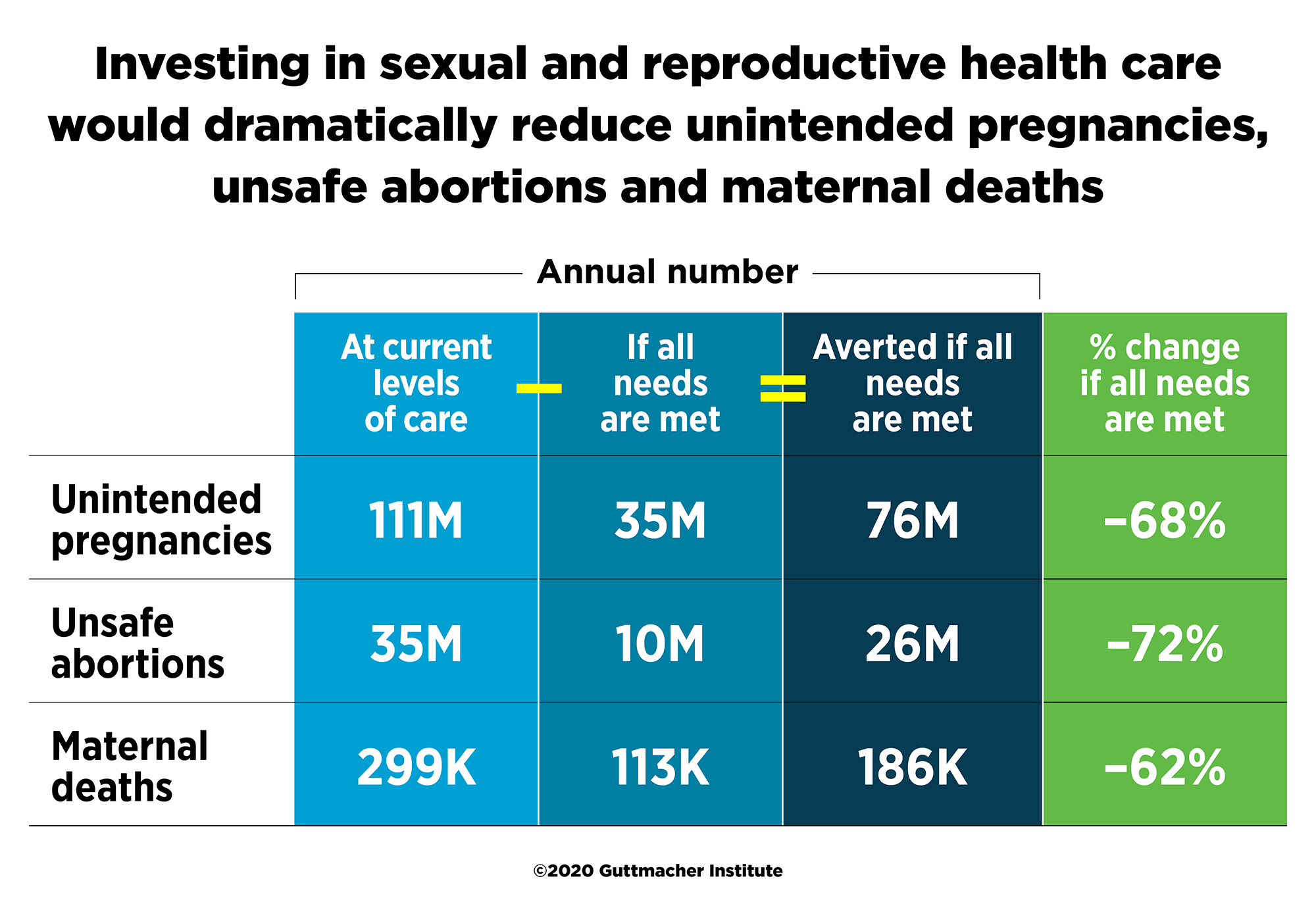New research released today by the Guttmacher Institute finds that 218 million women in low- and middle-income countries (LMICs) have an unmet need for modern contraception. In the 132 countries studied, the need is disproportionately high among adolescents aged 15–19 who want to avoid a pregnancy (43%, compared with 24% among all women aged 15–49).
Fully meeting the needs for sexual and reproductive health care would result in immense health gains, including a reduction of about two-thirds in unintended pregnancies, unsafe abortions and maternal deaths. Commitment to providing this essential care for all women is critical to upholding sexual and reproductive rights during and after the COVID-19 pandemic.
The study, called Adding It Up, documents the sexual and reproductive health needs of 1.6 billion women of reproductive age (15–49) in 2019, the positive impacts of meeting those needs, and the costs associated with improving and expanding services.
Each year, 111 million unintended pregnancies occur in LMICs, accounting for 49% of all pregnancies in those countries. Millions of people who give birth lack adequate pregnancy-related and newborn care, including 16 million women who do not receive necessary services to treat major obstetric complications. More than 35 million women have abortions in unsafe conditions and 133 million women need but do not receive treatment for one of the four major curable STIs.
"Our new data show that even before the COVID-19 pandemic, millions of people in countries with the fewest resources could not obtain lifesaving contraceptive, pregnancy-related and newborn care," says Dr. Herminia Palacio, President and CEO of the Guttmacher Institute. "Unless the global community prioritizes essential sexual and reproductive health services now, the pandemic could severely exacerbate those needs."
Investing in sexual and reproductive health care would greatly reduce health risks for individuals and their families:
- If all women in LMICs who want to avoid pregnancy were to use modern contraceptives and all pregnant women were to receive care that meets international standards, each year there would be:
- 76 million fewer unintended pregnancies
- 26 million fewer unsafe abortions
- 186,000 fewer maternal deaths
- If all mothers and newborns in LMICs were to receive recommended care, there would be 1.7 million fewer newborn deaths each year.
- If all women in LMICs received effective and timely treatment for STIs, the 3.5 million annual cases of infertility that are caused by untreated gonorrhea or chlamydia would be eliminated.
Cost and Savings Estimates
These potential gains are well within reach. A package of care that would meet all women’s needs for modern contraception, pregnancy-related and newborn care, and treatment for the four major curable STIs would cost just $10.60 per capita per year in LMICs. This is only $4.80 more per capita compared to current costs.
Crucially, these investments end up averting costs: Every $1 spent on contraceptive services beyond the current level would save about $3 in the cost of maternal, newborn and abortion care, because contraception reduces unintended pregnancies.
"It’s clear that public health emergencies like the one we are experiencing hit countries with limited resources the hardest, but setbacks are not inevitable," says Dr. Elizabeth Sully, Senior Research Scientist at the Guttmacher Institute and one of the lead researchers on the study. "We know exactly what is required to dramatically improve sexual and reproductive health outcomes. Failing to act puts the lives and well-being of millions at risk."
Inaction would have devastating consequences, economically, developmentally and from a human rights perspective. By investing in proven sexual and reproductive health interventions, countries can achieve progress toward their national health and development goals. They can also make greater strides toward achieving universal health coverage and the Sustainable Development Goals, which provide a critical blueprint for countries as they rebuild their health systems in the aftermath of the pandemic.
About the Guttmacher Institute
The Guttmacher Institute is a leading research and policy organization committed to advancing sexual and reproductive health and rights in the United States and globally. Information on the Guttmacher-Lancet Commission on Sexual and Reproductive Health and Rights, a comprehensive, evidence-based, bold and actionable agenda for key sexual and reproductive health and rights priorities globally, is available here.

